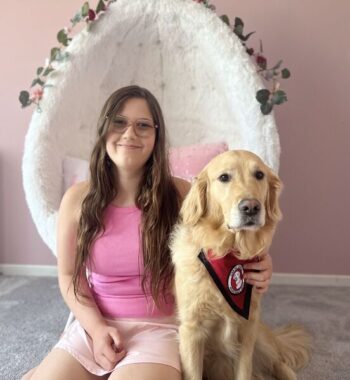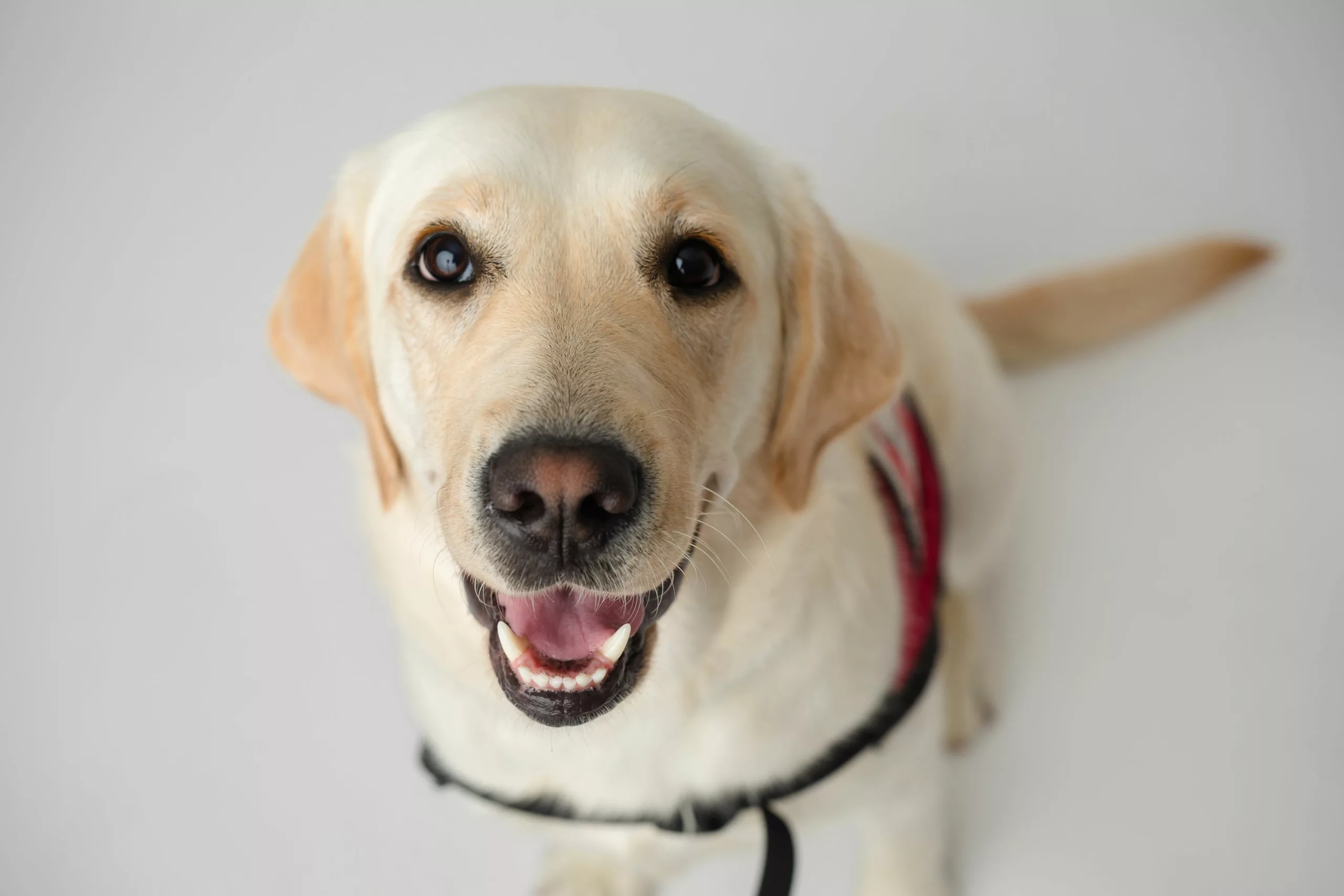“We don’t give up. We don’t teach that,” says Angela, the mother of six children. She remembers thinking this when she and her husband, John, were faced with overwhelming odds related to a series of difficult diagnoses given to their youngest child, Talia, years ago. Talia was born with hypotonia (a condition of low muscle tone), methylmalonic acidemia (a metabolic disorder), and a progressive neurodegenerative disease.
Although Talia likes to play outside and in the water, paint, and color with chalk, John says, “We started to see her less interested in things.” Plus, adds Angela, “We wanted Talia to be able to have some independence now that she's a teenager.”
 Added independence soon came in the form of a Golden Retriever-Labrador Retriever named Wylla. Paired in mid-2024, Talia and Wylla hit it off immediately. Angela says, “Wylla stepped in at a critical point for Talia and is just getting things done that none of us have been able to accomplish to this degree. I just don’t even know how to put it into words. It’s just unreal.”
Added independence soon came in the form of a Golden Retriever-Labrador Retriever named Wylla. Paired in mid-2024, Talia and Wylla hit it off immediately. Angela says, “Wylla stepped in at a critical point for Talia and is just getting things done that none of us have been able to accomplish to this degree. I just don’t even know how to put it into words. It’s just unreal.”
Armed with 46 cues and counting, Wylla can carry a bag for Talia, clean up items off the floor and put them into a basket, activate push plates, and retrieve dropped objects, just to name a few. According to John and Angela, the two most essential skills are when Wylla acts as a brace for Talia to get up off the floor and fetches one of them to assist Talia. When Talia has a bad headache, “she might not be able to then verbalize that she needs help,” explains Angela. “That’s where Wylla comes in. Talia will say 'Get help,' and then [Wylla] will come to me and she nudges my leg. And then I say, 'Show me,' and then she brings me to wherever Talia is in the house. That is an absolutely critical skill.”
When performing a “brace,” Wylla stands firmly beside Talia to allow her to put a hand on Wylla’s back for stabilization to stand up. In a store recently, Talia fell on the floor, and Angela reports, “Wylla knew exactly what to do. Talia didn’t say it right away because it took her a minute, but Wylla was already doing it and prepared to brace.”
“When Wylla does those skills, it reserves Talia’s energy, and the goal is to hopefully lessen some of that fatigue,” explains Angela. “That means she can maybe go longer in the day without a headache, or longer in the day to play and have fun and just be a kid.”
Angela goes on to say, “We never envisioned to this point of what it’s doing for Talia, how those critical skills are giving her a better quality of life. Nothing else in her world up to this point, not physical therapy, not water therapy, not OT speech therapy, not interventions. Nothing has done what Wylla is doing for her. We’re just in awe.”
They admit they can’t wait for their next doctor’s visit for Talia to show off the changes in her. John offers an example, saying “I could ask her to get a can of Diet Coke on the counter, and she’ll look at me like she has no idea what I’m talking about. It’s like she just loses that ability to do just the simplest thing. But then seeing the training she’s done in these skills, and it’s just amazing.” Angela points out, “We have seen Talia make some neuroconnections that we’ve never seen from her. Somehow she managed to memorize things that she's not been able to do in her day-to-day to life and we don't even know how she did it. We cannot wait to talk to her neurologist. They are going to be amazed as we are.”
The strides this team is making may open more doors for Talia soon. Currently, she goes to school for just a few hours, four days a week. Angela says, “It would be an incredible goal for Talia for that social piece as a teenager to be able to increase that time in person at school. Having Wylla there to help her with some of the skills is going to be crucial for her to be able to tolerate that.” Believing it to be possible, she comments, “Can Do Canines is giving her an incredible opportunity to have more independence, navigating on her own with Wylla.”
Keeping in mind all who have been a part of this journey, Angela states, “We could never express our incredible gratitude enough for everyone who played a role in getting Wylla to where she is today because they gifted Talia with way more than anyone could have possibly have expected or envisioned. I want every one of them to know they created an unbelievable critical part of a quality of life for our daughter that no one else has been able to emulate. You can’t even express or put it into words how profound this is for Talia and how much this is doing for her.”
Whether it’s from the security of sleeping nose to nose with Wylla or the encouragement from practicing skills, Talia’s confidence is blossoming. “There isn’t a day that goes by that I don’t tear up at some point when I see the two of them together,” admits Angela. “It’s just an example of Talia’s determination and resilience with everything that’s been handed to her. And Wylla is that light that’s been brought in to show her that giving up is not an option. Wylla is teaching Talia that she’s more than capable of absolutely anything and that there’s no obstacle that should stop her from reaching her goals and what she wants to do.”
And that’s just what this family strives for.
Thank you to all those who made this partnership possible:
Whelping Home — Kolleen Herr
Raisers — Grant Hendrickson, The Kromer-Ide Family, Jim & Carol Wacek
Special Thanks — Federal Correctional Institution-Sandstone, Jackson Correctional Institution
Team Sponsor — John Manthey, in memory of Bonnie Manthey

 Happy Holidays
Happy Holidays




